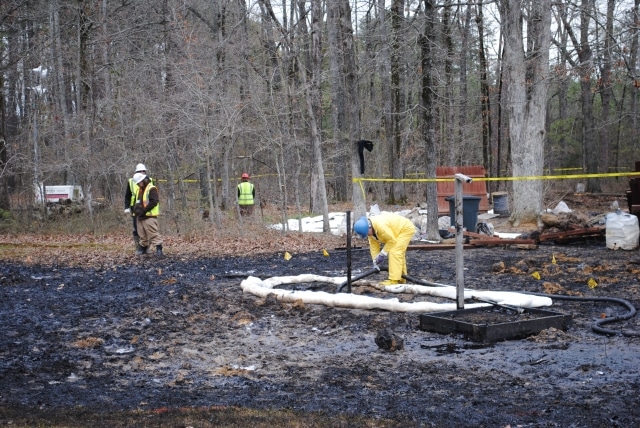It’s been over five weeks since ExxonMobil’s Pegasus pipeline burst beneath a Mayflower, Arkansas subdivision, spilling diluted bitumen born of tar sands throughout the neighborhood. Five weeks later, and still the air carries noxious fumes. Residents complain of headaches, nausea, and worse.
Meanwhile, these residents of Mayflower are getting mixed signals from various state agencies, as well as the EPA and ExxonMobil.
While Exxon, the EPA, the Arkansas Department of Environmental Quality (ADEQ), and the Arkansas Department of Health are assuring the community that the air is safe, Arkansas’s Attorney General Dustin McDaniel isn’t so sure.
“As we met with residents and groups that represent them, like Remember Mayflower, I heard time and time again about their health, especially the health of their children,” McDaniel said last week. “Many continue to suffer from headaches and nausea and air sampling continues to show that the carcinogen benzene remains in the air.”
Quite a contrast to the claim written on the Arkansas Department of Environmental Quality (ADEQ) website that hosts all of the EPA and Exxon’s air quality test data: “Overall, air emissions in the community continue to be below levels likely to cause health effects for the general population.”
Exxon’s spokesman Aaron Stryk similarly told the Arkansas Democrat-Gazette that “Ongoing air monitoring in the Mayflower community has shown levels that are either [nondetectable] or below action levels established by the Arkansas Department of Health.”
In his press conference, Attorney General McDaniels emphasized that benzene, a known carcinogen, has been detected inside some homes. “I have a real concern about the short- and long-term effects of carcinogens released into the air which are still detectable in the living rooms of people in that area.”
Countering the safety claims of various agencies, including his fellow Arkansas state officials, he asked, “Who determines what’s an imminent health risk?…And if it was your house, how much would you be content to have benzene in the living room and be comforted that it’s not an imminent health risk?”
The Arkansas Department of Health, however, took a far more relaxed approach in advising and protecting Mayflower residents. Public comments from the chief of emergency response, Dr. William Mason, as reported by InsideClimate News, put the onus of public health responsibility directly on the residents themselves. “When you have a population that’s been exposed to noxious fumes of this type…there’s going to be a response,” Mason said. “It can be dizziness, nausea, headaches or vomiting…Certainly if they were having complaints, the option for them to leave is their personal choice.”
Many residents clearly are taking it upon themselves to leave, and not just temporarily. As fears spread that the neighborhood and surrounding areas will never be the same after the spill, many Mayflower homeowners are looking to sell their homes. The question is: to whom?
ExxonMobil has presented a plan to purchase eleven homes that were immediately impacted by the spill, at prices equal to an appraisal if the spill had never occurred. However, neighbors in the Mayflower subdivision, and those with property along the Lake Conway cove where dilbit has been discovered, have been offered no such deal. The company says it will compensate other residents for “all valid claims.” Attorney General McDaniels says that this plan does not go nearly far enough.
“I believe that Exxon should offer to purchase all the affected properties” in the Northwoods subdivision, as well as those near the cove, at a pre-spill appraisal price, McDaniel said.
“Everybody’s selling” who can, attorney John Ogles, who represents one homeowner family, told the Arkansas Democrat-Gazette, “I haven’t heard of anybody that’s going to move back in.” Ogles continued, “Our clients’ house smells like a dang auto garage where the engine’s been running six months with the windows closed,” Ogles said. “They’re probably going to have to tear it down. … You can’t live in it.”
Subscribe to our newsletter
Stay up to date with DeSmog news and alerts







